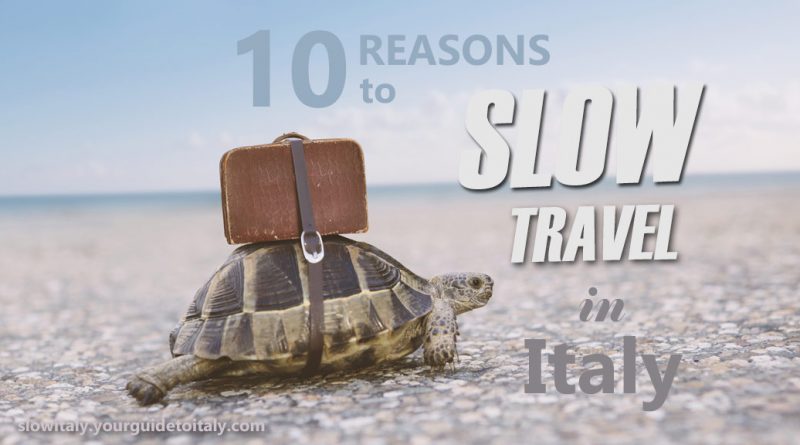Why is Italy the Slow travel country par excellence?
How does our slow traveling also benefit the country we are visiting?
1. Italy counts 20 regions that are as different from one another as entire countries.
Italy is a young country, which became a unified nation only in 1861, after having been a confederation of states and principalities for most of the previous thousand of years.
Add to that the country’s unusual boot-like shape – long and narrow, surrounded by seas and with big mountains in the North – and it will come as no surprise that every single region is almost a nation on its own, worth visiting for its specific culture, history, landscape and cuisine. That’s why scaling and slowing down to explore one “mini-country” at the time is the best way to explore Italy.
2. Italy counts the highest number of UNESCO world heritage sites in the world
Precisely because of Italy’s overwhelming number of high-profile tourist attractions, an incredible amount of amazing historic, cultural and architectural sites in the immediate neighborhood of these tourist magnets often remain off-the-radar. Many of these sites are often not even known by Italians themselves, so let alone by visitors from abroad.
Because of the high density of “must-see” sites, you will probably only see 1% of them anyway. You can only add as many as 10 or 20 “important” sites in a “must-see” list, even if you rush through the country on a check-list basis. So, why not slow down and take the time to alternate between must-see sites and more authentic, off-the-beaten track places within a region of Italy.
3. Italy boasts an impressive number of national parks, archaeological sites and beautiful stretches of coast that need protected and preserved.
Due to the high density of these sites and the specific geography of Italy, new accommodation specifically built for tourists (large tourist resorts, huge apartment blocks specifically designed to be rented to tourists), but also large cruise ships which disembark thousands of tourists at the same time in one place, almost always have a devastating impact on these natural and archaeological sites, whether environmentally, economically, urbanistically or socially.
So, by slow traveling and handpicking your accommodation you can reduce this impact and even positively contribute to improve the evolution.
4. Italy counts a great number of beautiful historic buildings: castles, historic mansions, abbeys, convents in need of preservation and restoration
Due to the high number of these historic buildings, many of which are still privately owned, funding for preservation and restoration are often lacking and a lot of these magnificent buildings are left to crumble.
Fortunately, in recent years, individual initiatives are flourishing to turn these buildings of historic and architectural value into boutique hotels or B&Bs. Choosing to stay in this type of accommodation, which makes use of existing buildings, has a lower impact on the natural and urban landscape. Additionally it is also a way to contribute the preservation and restoration of a unique cultural heritage for future generations.
The principle is comparable to the Paradors in Spain and the Pousadas in Portugal. The hosting activity is used to finance renovation works and keep the small local villages in which they are located together, by combating rural desertification. The same goes for the alberghi diffusi, a type of hotel accommodation that make use of existing village houses, with often the breakfast room, reception and rooms scattered over different buildings of the village.
This proves that slow and responsible travel are not limited to a specific segment as conscientiously handpicking your accommodation and making maximum use of existing resources without requiring new infrastructures, specifically built for tourists, is possible in every segment of the tourist industry. Staying in a luxury boutique hotel or B&B housed in a historic building, can be just as slow and sustainable (and not necessarily more expensive!) as other, more “visibly”, environmentally friendly ways of traveling.
Agriturismi are conceived on the same principle: by diversifying into the travel industry, family-owned farms manage to survive in an increasingly difficult economy. Just like family-owned and -run B&Bs in locally-run hotels they have a low impact on the environment as they are perfectly integrated into the landscape of the town or area.
5. In Italy, the food is everywhere…and it’s to die for!
It takes some slowing down to travel while savoring the real Italian food. In authentic, local Italian restaurants, dishes are prepared on order from fresh ingredients, so, on average a lunch or dinner in an Italian restaurant will take more time than in a standard restaurant abroad.
Our advice is to skip the so-called “international” restaurants in the main street of busy tourist spots, offering a standard menu in five different languages. Instead, go for the Trattoria or Osteria in the back streets where you may end up eating on a paper tablecloth, served by waiters who may not speak a word of English (don’t worry, Italians are experts in unofficial sign language), but where you’ll taste the deliciously authentic food. There may or may not be a menu (typically the shorter the menu and the less standard dishes it contains, the better). If they don’t have a menu at all, even better. It means that the dishes are chosen on a daily basis according to the availability of market fresh produce.
As we said, it might take a little more time to dine at the rhythm of the other Italian guests, but you will feel spoiled like a granddaughter at her nanna’s home.
6. Italy is a multi-sensory place that you can only fully appreciate when visiting it with all your senses open.
Much of the country’s splendor lies underneath the surface, not just in the obvious historic and architectural treasures. It takes some slowing down to take in the beauty and soak up the atmosphere of a place, and even more so, to see how passionate people are about their territory, their culture, their craftwork when you take the time to show a little interest.
7. In Italy, “slow” doesn’t have the same meaning as in the rest of the world
In Italy “slow” stands for deep and mindful, not for the opposite of “fast”.
It is not so much that the pace is more laid back, but Italians put a higher value on other values (meals, family, catching up with friends, solidarity), rather than merely doing things fast.
While much of the rest of the world equals “fast” to “good” (“how fast can this be done? How fast can you deliver?), in Italy it is quite the opposite. The reason is that in Italy, more than any other country, what is hand-made and produced on order is considered a sought-after quality. However, what is locally produced on order takes more time. So “slow” has always stood for quality, even long before it was coined into a label for “Slow Food” by Carlo Petrini.
For Italians time is simply subordinate to other more important values: authenticity, family, genuinity, excellence and mastership. Where everywhere else most people tend to be competitive in terms of price or time, Italians strive for excellence, even in the most mundane tasks.
The fact that Italians are able to take plenty of time for family, meals and communication, doesn’t mean that they can’t do things faster (actually, Italian waiters work pretty fast as compared to many countries), it just means that they are conscious and mindful. It’s that same type of mindfulness that will make you fully appreciate your time as a traveler in Italy.
8. In Italy, time is your friend, not your enemy
People and situations tend to be spontaneous and unpredictable, so make time work as your friend not your enemy.
Often you will find that the opening hours do not correspond to what is written in your guide book or that the shop is “open”, but that the shopkeeper “will be back in 15 minutes” (which may turn out to be 35 min).
An bus may leave at a certain time or may not. It may be a bit later or significantly later, but it will eventually leave. If you don’t allow a bit of flexibility and creativity into your plan, you’re probably in for a lot of frustration.
In terms of timetables, applying the 80/20 principle really is a must!
As you’re kind of “forced” to slow down, the best way is the take the approach of seeing the positive side of it. Even if you usually rush when you walk, you will have to slow down on the cobbled streets. If you travel by car you will often have to park outside the city or far from the place where you are headed to, so take the opportunity to take in the details and experiences that you would otherwise not see (beautiful doorways, street vendors selling local products, interesting hidden places)
Believe me, there is ALWAYS something going on in Italy that is worthwhile watching!
9. In Italy, time and distances are not as in your home country.
We already explained why time is different is in Italy. The same goes for distances.
Italy is a particularly dense country, where distances may seem small, but going from one site to the next can be very time-consuming (roads are slow, public transport may be lacking) and full of wonderful distractions. You may soon find out that covering the same distance in Italy can take up much more time than you had thought.
In a country like Italy you will often have to re-route, re-schedule, so incorporate these setbacks as welcome ingredients in your travel mix instead of letting them stress you or discourage you.
10. In Italy things will always work out one way or the other
Italians are very practical people. A common verb is arrangiarsi, which can take on a lot of definitions, but basically means that somehow, no matter how, Italians will make things work out. It may not be the way it was planned, but it doesn’t really matter because often the outcome equals or surpasses expectations in some way.
The best way to make things work for you as a traveler is to adopt the same philosophy and go with the flow instead of resisting it. Try to make the best out of every situation or set back, and fortunately, in Italy, resources to do so are limitless… IF you are ready to get out of your comfort zone.
As a bonus, you will end up being much more creative and resourceful as a person yourself!

